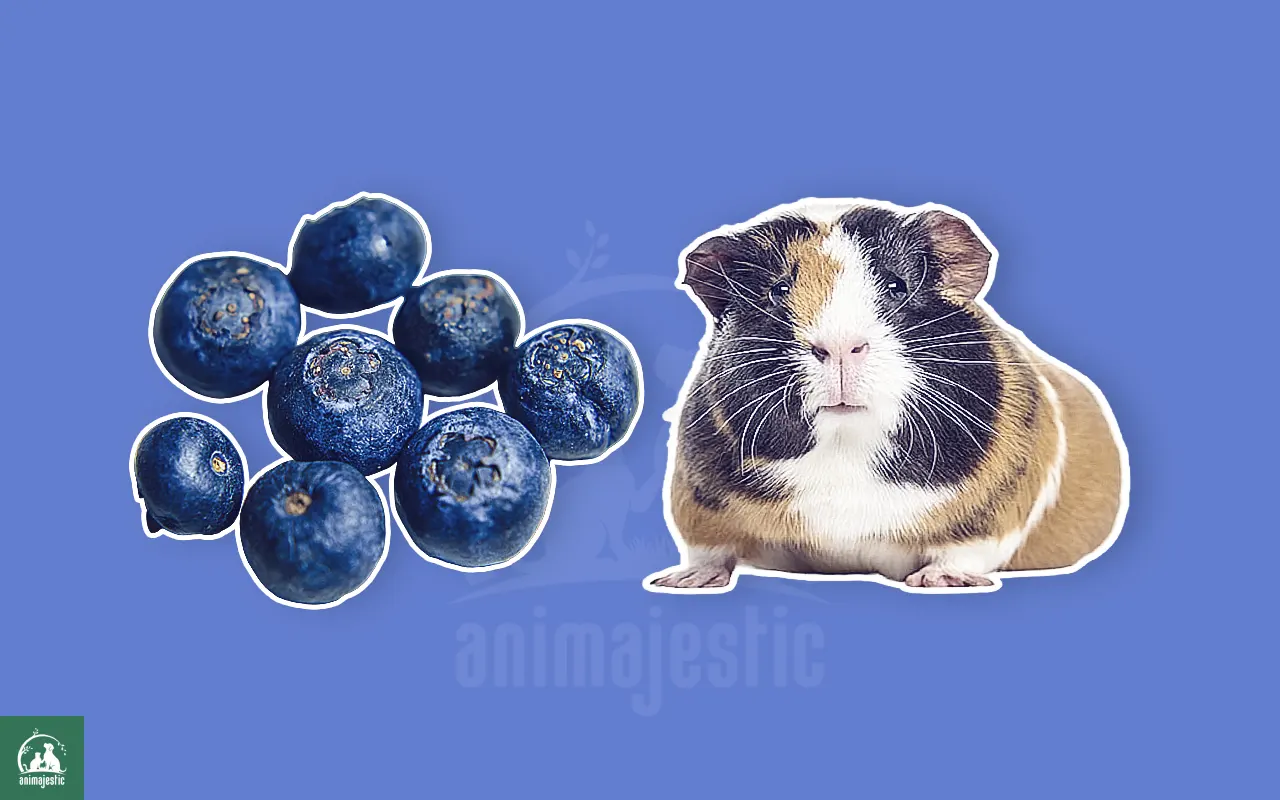Today, I will help lift the veil on an intriguing topic – “Can guinea pigs eat blueberries?”. By the end of this comprehensive article, you’ll have an extensive and exceptional understanding.
As a guinea pig owner or prospective guinea pig parent, you’ve probably deliberated over their dietary needs and the best meal plan to keep them in tip-top health.
One of them is blueberry, and it is time to stay with me till the end.
Nutritional Side of Blueberries
To evaluate whether guinea pigs should incorporate blueberries into their diets, we must first examine the nutritional profile of these small, mighty fruits.
Blueberries are well-regarded among fruits as they are abundant in:
- Antioxidants, mainly anthocyanins
- Dietary fiber
- Vitamin C and K
- Manganese
While blueberries boast plenty of benefits for humans, it’s essential to determine if those advantages resonate with our guinea pig companions.
Their Dietary Preferences and Needs
Guinea pigs are gentle herbivores with a diet consisting of hay, vegetables, fruits, and pellets.
Their bodies require:
- A high-fiber diet, predominantly from hay
- Vitamin C, which they cannot synthesize themselves
- A balanced proportion of proteins, minerals, and vitamins, to maintain optimal health
When finding out if blueberries are an appropriate food choice for guinea pigs, it’s important to recognize the differences between their nutritional requirements and those of humans.
So, let’s examine the potential benefits and drawbacks of serving blueberries to guinea pigs to make an informed decision.
Potential Pros of Blueberries for Guinea Pigs
Keeping in mind guinea pigs’ dietary requirements and the nutritious attributes of blueberries, it seems plausible that blueberries could be advantageous. Their potential benefits include:
- High Vitamin C Content: Guinea pigs cannot produce their own vitamin C, so including vitamin C-rich food in their diet is a must. Blueberries, being high in vitamin C, can provide a supplemental source of this essential nutrient.
- Rich in Antioxidants: The high antioxidant levels of blueberries may enhance the overall health of guinea pigs, similar to their effects on humans.
- Source of Dietary Fiber: Guinea pigs require a high-fiber diet to maintain a healthy digestive system, and blueberries offer an additional source of fiber.
Evaluating these benefits, you might be tempted to let your guinea pig nibble on blueberries day and night. However, of equal importance are the potential hazards this fruit offers our cavy friends.
Possible Downsides of Blueberries for Guinea Pigs
Acknowledging the potential benefits of blueberries, it’s equally vital to remain vigilant about the risks and issues associated with adding them to a guinea pig’s diet:
- High Sugar Content: While blueberries’ natural sugars are relatively harmless for humans, guinea pigs have lower sugar tolerance. Consuming excessive sugar can lead to health problems like obesity, diabetes, or gastrointestinal issues.
- Not a Dietary Substitute: It’s essential not to mistake fruit for a mainstay of a guinea pig’s diet. Hay, pellets, and other vegetables should remain their primary food sources.
Taking these potential upsides alongside the drawbacks, let’s form a well-rounded conclusion about incorporating blueberries into guinea pig meal plans.
So, Can Guinea Pigs Eat Blueberries?
The answer is a cautious “YES.” With a clear understanding of their dietary needs, guinea pigs can enjoy blueberries with some limitations:
- Blueberries must be fed sparingly and in moderation, serving as a treat and not a dietary anchor.
- Fresh and organic blueberries are the most appropriate choice to minimize pesticide and chemical exposure.
- Other fruits and vegetables should still be part of your guinea pig’s balanced diet.
When feeding guinea pigs blueberries, moderation is critical. As long as you provide a diverse diet that also includes hay, pellets, and leafy greens, offering the occasional blueberry treat is a delightful and nutritious choice.
A Well-Balanced Diet for Guinea Pigs
Apart from blueberries, guinea pigs can benefit from the inclusion of various other elements in their diet:
- Hay: A high-fiber diet, primarily composed of hay, is essential to guinea pig health.
- Pellets: Fortified pellets enriched with vitamin C are excellent for supplementing your guinea pig’s dietary needs.
- Leafy Greens and Vegetables: Offering leafy vegetables such as lettuce, spinach, or kale helps balance out guinea pigs’ nutritional requirements.
- Hydration: Providing fresh, clean water consistently is crucial to keeping your guinea pig hydrated and avoiding health complications.
By creating a holistic and well-rounded diet for your guinea pig, you will nurture a loving and lasting bond with your energetic and playful companion.
Conclusion
To wrap up, guinea pigs can indeed eat blueberries, but in moderation. Blueberries should serve as a supplementary treat to a balanced diet composed primarily of hay, pellets, and leafy greens.
By offering a healthy, diverse, and nourishing meal plan for your guinea pig, you can guarantee that their little life is filled with joy and vitality.
As guinea pig parents, we are their guardians and providers, and catering to their nutritional needs is our responsibility.
As we embark on the endearing journey of pet parenting, ensure you prioritize the well-being of your beloved guinea pigs and share the delightful nourishment of blueberries – in moderation, of course.
Cheers to bountiful health, quivering whiskers, and wiggly noses!
